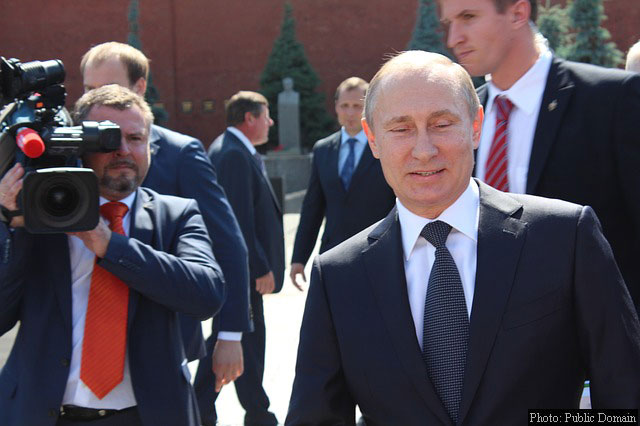
I have no need to demonstrate my anti-Putin bona fides, but I just roll my eyes at the hysterical response to his intervention in Syria, and today’s launch of Russian bombing operations. There is much shrieking about the fact that the Russians say they are bombing Isis, but in fact launched a raid on Homs where Isis was not present.
The Russian response is, basically: “Hey, they all look alike to us.” There is much truth to that.
This is not that complicated:
- Russia is intervening to save Assad from imminent defeat, and to protect its ports in Syria.
- Isis is not the most immediate threat to either Assad or the Russian facilities.
- Therefore, Russia will focus on non-Isis targets, while claiming to be fighting Isis.
This is really not that much different than the Turks using Isis as a pretext to attack their real enemy, the PKK.
Yes, this campaign will help Assad, and Assad is an evil bastard. But the Islamists that are dominating the anti-Assad forces are evil bastards too. Many are Al Qaeda offshoots, and others are indistinguishable from Al Qaeda in their ideology and agenda. Or from Isis, for that matter. They are Sunni supremacist Islamists. And wouldn’t you know, we are fighting Sunni supremacist Islamists around the world, and have been for going on 15 years.
There are no good guys in Syria. Stop pretending there are: there is considerable reason to doubt there ever were. And any differences between Isis and the non-Isis Islamists the Russians are bombing are trivial. They do all pretty much look (and act) alike. And what’s more, pretty much everyone in the West looks the same to them: they all think your head would look just splendid mounted on a spike in the front yard.
And yes, Assad’s forces will slaughter his foes if they win. But Assad’s foes will slaughter Assad’s supporters if they win. Syria is a charnel house being fought over by demons. There is a symmetry of evil.
It is particularly rich that those who are shrieking about Russian involvement say that it will radicalize Sunnis.
Um, where are these people been? Since like 700AD, let alone since 2001 or 2011? Radicalization is a done deal, and the most that the Russians can do is gild that lily.
Moreover, I actually find myself agreeing with some in the administration here. If you truly believe that Syria is a pointless slaughter that we should avoid at all costs (and I believe that is the case today), why would you oppose Putin jumping in? The administration believes (rightly) that we have no current military options that would generate results that even remotely justify the costs: the military realities are exactly the same for Putin. Yes, he will likely secure a rump Syria with its shambolic Russian port facilities (which is more than we could gain). But his airpower is going to be no more decisive than ours, and he is putting himself at risk of getting sucked in more deeply in ways that will cost him blood and treasure that he can’t afford.
As I said before: don’t interrupt an enemy while he is making a mistake.
As for the US, Russian involvement is leading some to advocate getting more heavily involved ourselves. Another military adage is: don’t reinforce failure. Failure is the charitable way of describing US policy in Syria. Don’t reinforce it. Let it go. It’s past our ability to save, or even palliate. It’s done. Both sides.
Let Putin find out the hard way.



Leave a Reply